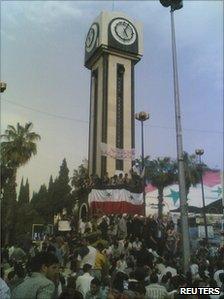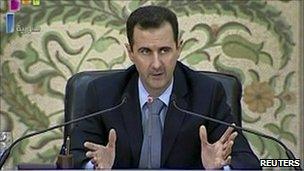Syria unrest: Protests spread despite Assad promises
- Published

Protesters staged an Egypt-inspired sit-in in Clock Square in Homs
As the Syrian protests spread to cities across the country, President Bashar al-Assad has been holding out both carrots and sticks - but neither seems to be working.
"Syria is not Assad's. Syria is a country of free people," says Muntaha al-Atrash, the daughter of Sultan Pasha al-Atrash, who led the revolution against the French in the 1930s.
"They killed to be in power and have stayed there by power and repression only," she says, referring to the iron-fisted rule of the Baath Party, which came to power in a 1963 coup.
"It is time for them to leave," Ms Atrash told the BBC.
Syria has been rocked by weeks of protests calling for freedom, democracy and an end to corruption. Hundreds have been arrested, and more than 200 killed by security forces since the start of the month-long uprising.
President Assad - who inherited power from his father in 2000 - has been offering some reforms in recent weeks, even promising to lift the decades-old emergency law, the most pressing demand of the protesters.
"There has been a change in style, which may prove effective if the authorities are quick to deliver the goods," says Peter Harling, project director of the Middle East programme at the International Crisis Group.
"But there also is the issue of radicalisation, wherever protests have led to violence."
The main centres of unrest are in the southern province of Deraa, the major towns of Latakia, Baniyas and Homs, as well as the suburbs of Damascus, and the majority Kurdish regions in the north.
"In those areas, [protesters] will settle only for full accountability. They want a state that protects its citizens, not one that they accuse of acting with impunity," says Mr Harling.
Palpable fear
Despite the promises of reform, the security forces continue to favour heavy-handed tactics. People are looking over their shoulders once again.
"It is just like the 80s," says one opposition figure in Damascus who asked not to be named.
"Anything we say is a reason for arrest. People are taken in the streets, from cafes, from their homes."
But this has not stopped pro-democracy supporters from marching.
On Monday, hundreds staged a sit-in in the main square of the western city of Homs, bringing mattresses, food and water to the site for an Egypt-style standoff. They stayed until dawn on Tuesday, when security forces fired tear gas and live rounds, witnesses said.
"The genie is out of the bottle and it doesn't look like it's going back," the opposition figure said.
Facing the biggest internal threat since he took power 11 years ago, Mr Assad ordered the release of many who were arrested in recent weeks.
Those freed tell of brutality and torture at the hands of security forces.
"They have turned every detainee into a time bomb against them," said one activist who left prison with bruises and broken ribs.

Bashar al-Assad inherited power from his father Hafez in 2000
According to Amnesty International, external, at least 200 people have been killed in clashes with security forces.
The government blames the violence on "armed gangs", but the families of those killed said it was the security forces who fired.
In some cases, like Baniyas, some army and security personnel also died in the clashes.
Residents say it was a cruel ploy by the army, which shot at some of its own soldiers to bolster its claims about armed gangs and infiltrators.
Cyber-activists
The Assad administration has also sought to sow sectarian fears.
It claims to have documents indicating that a Saudi prince has pumped millions of dollars into the country to de-stabilise Syria.
The papers make reference to the bombing of churches, the regime has claimed, which has alarmed Syrian Christians in the run-up to Easter celebrations.
On Monday, the government issued a statement blaming "armed Salafist groups" for the unrest, referring to an ultra-conservative form of Islam that is popular in Saudi Arabia.
The government is also using state media institutions to spread its message, while clamping down on independent news agencies.
It has criticised Arab broadcasters for using what it calls made-up videos from YouTube and accused international journalists of playing a provocative role.
Videos of the protests have been posted on Facebook, YouTube and Twitter by Syrian citizens inspired by the cyber-activists in the recent revolutions in Tunisia and Egypt.
Most of the activists use pseudonyms for safety reasons, including 28-year-old Malath Oumran, whose real identity has been discovered by the authorities.
"Although most of us use pseudonyms, we have nothing to do with international forces," says Mr Oumran, who is originally from Suweida, but currently living in the Lebanese capital Beirut.
"We are all young Syrians who care about the country and we want the world to know the truth."